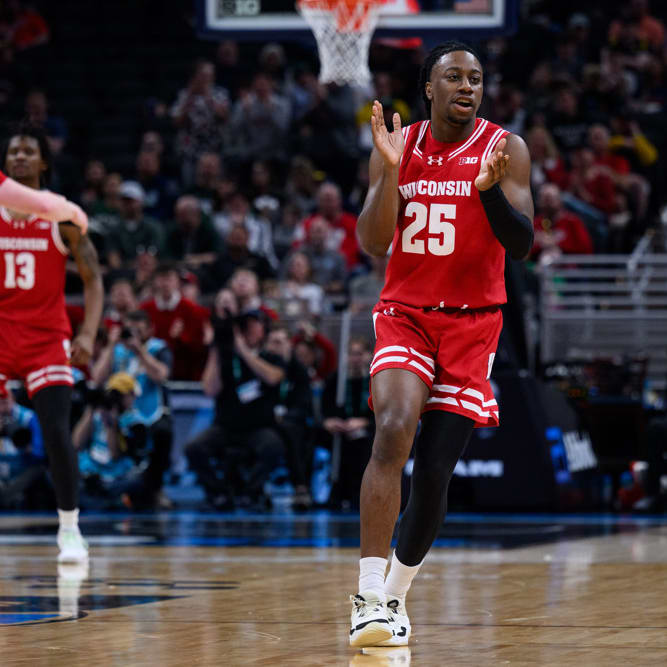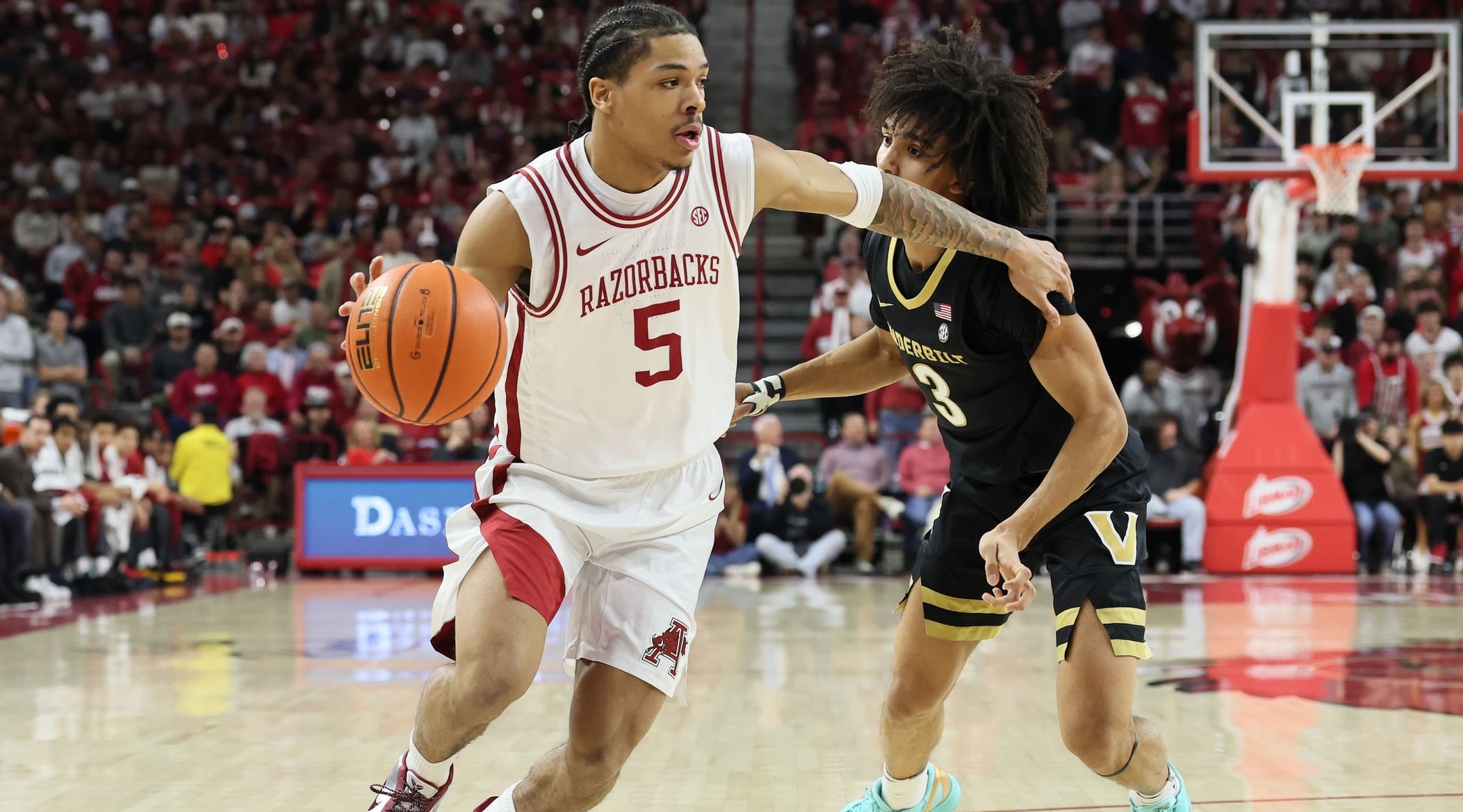Midwest Region
West Region
East Region
South Region
Site: Washington, D.C.
Tipoff: Friday, March 29
As is the case with the West Region, the East's top seeds held serve through two games and we'll have a star-studded, chalky Sweet 16 in the nation's capital. Just three lower seeds won opening round games, with none surviving the Round of 32, and the top two seeds enter Friday's games as the two biggest favorites of the day. Is there anything standing in the way of a Duke-Michigan State collision in the Elite 8?
 No.1 Duke vs.
No.1 Duke vs.  No. 4 Virginia Tech
No. 4 Virginia Tech
Key Matchup: Virginia Tech guard Justin Robinson vs. Duke guard Tre Jones. Robinson came off of the bench in both games last weekend, being eased back into action for the first time since late January. He looked a bit more like himself against Liberty, going for 13 points, four rebounds and two steals, but did commit six turnovers over the opening weekend. He'll likely need to be better against the defensive-minded Jones, who has also seen an uptick in offensive usage as teams dare Duke to shoot. Jones has hoisted 12 or more shots in four of his last five games, but has hit just 23-of-60 (38.3 percent) during that stretch. It's possible these two cancel each other out, but a big game from either will likely have their team on the winning side.
Duke will win IF: It bullies the Hokies on the interior. I expect Virginia Tech will play
Midwest Region
West Region
East Region
South Region
Site: Washington, D.C.
Tipoff: Friday, March 29
As is the case with the West Region, the East's top seeds held serve through two games and we'll have a star-studded, chalky Sweet 16 in the nation's capital. Just three lower seeds won opening round games, with none surviving the Round of 32, and the top two seeds enter Friday's games as the two biggest favorites of the day. Is there anything standing in the way of a Duke-Michigan State collision in the Elite 8?
 No.1 Duke vs.
No.1 Duke vs.  No. 4 Virginia Tech
No. 4 Virginia Tech
Key Matchup: Virginia Tech guard Justin Robinson vs. Duke guard Tre Jones. Robinson came off of the bench in both games last weekend, being eased back into action for the first time since late January. He looked a bit more like himself against Liberty, going for 13 points, four rebounds and two steals, but did commit six turnovers over the opening weekend. He'll likely need to be better against the defensive-minded Jones, who has also seen an uptick in offensive usage as teams dare Duke to shoot. Jones has hoisted 12 or more shots in four of his last five games, but has hit just 23-of-60 (38.3 percent) during that stretch. It's possible these two cancel each other out, but a big game from either will likely have their team on the winning side.
Duke will win IF: It bullies the Hokies on the interior. I expect Virginia Tech will play a good amount of zone defense, hoping to keep Duke out of the paint and reliant on long-range shots -- Duke's clear Achilles' heal. But Duke has a monster size advantage, as forward Kerry Blackshear is the only Hokie north of 6-foot-6. Duke has already shown to be terrific at getting offensive put backs, and if we assume Blackshear contains Zion Williamson individually, that leaves no answer for Cam Reddish, R.J. Barrett, Javin DeLaurier and Marques Bolden, all lengthy options in addition to being taller. This size advantage may be so great it won't matter if the Blue Devils have success from long range, something they enjoyed more last weekend than they have all season long, hitting 18-of-44 (40.9 percent), compared to their season average of 30.7 percent.
Virginia Tech will win IF: They can control tempo. In half of the Hokies' eight losses, they've allowed 72 points or more, while Duke has been held under 73 just nine times, including each of their last three losses. VT ranks 332nd in adjusted tempo, while Duke ranks 18th. For as close as UCF came to the upset, its biggest fault was trying to run more than usual with Duke, which isn't its game. It's not the Hokies either, and while they have better offensive parts, Virginia Tech needs to make this largely a half court game. Tech's chances of winning decrease if it requires 80-plus points. Team rebounding will also be of paramount importance given VT's lack of height.
Player to watch: Kerry Blackshear Jr. Virginia Tech. Simply put, Blackshear has to stay on the court for the Hokies to have a chance. He's fouled out in two of VT's losses and had four fouls in two others, but gashed Duke for 23 points and 10 boards in a regular season meeting. He needs to reach double-digit rebounds in this contest, and also use his four allowed fouls wisely. If/when the fifth foul comes, the Hokies will be doomed on the interior.
Prediction: There's little doubting VT's talent being an upgrade to that of UCF. But the Knights had significantly more size to combat Duke's plethora of big bodies. There could be a bit of home-court advantage for Virginia Tech with so many alumni in the D.C. area, but Duke has shown they know how to close games in March. The Blue Devils find away again to get it done in the game's final four minutes.
 No.2 Michigan State vs. No.3 LSU
No.2 Michigan State vs. No.3 LSU
Key Matchup: Michigan State guard Cassius Winston vs. LSU guard Tremont Waters. Both sides have deep, long, imposing front courts, but there's no getting around this duel of lead guards. Waters has been brilliant as a distributor, dishing out 12 assists last week, but he's disappeared from the scoring column for long stretches and has hit only 1-of-9 from 3-point range. Winston, on the other hand, put his team on his back in Round 1 against Bradley, scoring 26 points to stave off an upset, one point fewer than Waters had in both games last weekend. He turned into a facilitator in Round 2, handing out nine dimes. The Tigers likely face long odds at an upset if Waters can't match Winston's production; whether that's Waters with an uptick in scoring, or clamping down on Winston, seemingly isn't relevant.
Michigan State will win IF: It continues to share the ball. The Spartans rank fourth in offensive efficiency, 15th in effective field goal percentage, 24th in 3-point percentage and 28th in 2-point percentage. Why? Because they lead the nation in assists to field goals made at an incredible 67.2 percent. Winston leads that charge, but making the extra pass leads to clean, open looks across the offense. LSU isn't particularly great at anything defensively, and if MSU continues to move the ball, it's going to be difficult for the Tigers to get enough stops to win.
LSU will win IF: They win the second-chance points battle. The Tigers rank eighth nationally in offensive rebound percentage, pulling them down at a 36.8 percent clip. But LSU has a minus-4 offensive rebound total through the tournament's first weekend, and rank 266th nationally in offensive rebounds allowed. They don't shoot the 3-ball well (32.0 percent, 289th nationally), and will need these second chance opportunities to keep up with the Spartans' offensive efficiency, and to combat MSU's eighth-ranked defensive efficiency.
Player to watch: Nick Ward, Michigan State. The paint is going to be a war on both sides, with LSU's Naz Reid and Kavell Bigby-Williams battling MSU's Kenny Goins and Xavier Tillman. But the Tigers don't have a third option off their bench like Ward, who played 20 minutes in Round 2 against Minnesota -- his highest total since returning from a hand injury that cost him nearly a month. Tillman committed four fouls in each of last weekend's games, while Goins did so once. Another week removed from injury, Ward seems ready to play as much as needed, and gives MSU a depth edge on the interior.
Prediction: Fading LSU last weekend was a head over heart issue for me, as I love its talent, but questioned the off-court distractions. Prior to Will Wade's mess, I thought the Tigers had Final Four potential. While that's still the case, it's a tough ask to expect a poor-shooting LSU team to beat a seasoned Spartans side. I expect this will be a tremendous, back-and-forth game, but too many offensive droughts and not enough stops doom the Tigers.







































